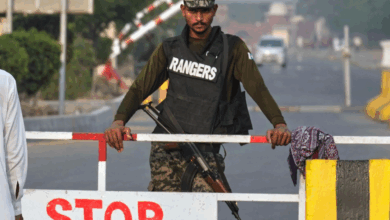Power Outages in Spain, Portugal, and France Disrupt Travel; Cause Remains Unclear as States of Emergency Declared

Spain (WE) — Massive power outages swept across Spain, Portugal, and parts of France on Monday, paralyzing transportation networks, stranding travelers, and leaving millions without electricity. Governments in Madrid and Lisbon responded by declaring states of emergency, as utility companies raced against time to restore critical infrastructure before nightfall.
In an unprecedented move, Spain’s Interior Minister Fernando Grande-Marlaska declared states of emergency in the regions of Andalusia, Extremadura, Murcia, La Rioja, and Madrid. Meanwhile, Portugal’s Prime Minister Luis Montenegro announced a national energy crisis following an emergency late-night Cabinet meeting.
“We have learnt of a general blackout in the electricity grid, which originated outside our territory, most probably in Spain,” Montenegro said during a televised address. He added that a government crisis office was now operational to manage what he described as an “unprecedented” situation.
The prime minister urged Portuguese citizens to minimize their energy consumption, especially as authorities continued working through the night to stabilize the grid.
Power Slowly Returns, But Travel Remains Frozen
In Valencia, Spain, the lights began flickering back Monday evening. Residents in the old city center erupted in cheers when electricity returned, though many other neighborhoods remained dark.
As the Mediterranean city celebrated the feast day of its patron saint, the blackout initially went unnoticed — until cell phones lost signal and parade participants grew concerned. Makeshift announcements blared from a car radio wired to loudspeakers, as residents leaned from their balconies calling for news.
Valencia’s Mayor Maria Jose Catala advised people to stay home and conserve energy. In a statement posted on X, she confirmed that gasoline reserves were being directed to hospital generators and essential services. Over 150 passengers were rescued from a stranded train near Joaquin Sorolla station, and firefighters responded to more than 130 emergency calls, mostly assisting those trapped in elevators.
All trains in Valencia were canceled, and the city’s airport became a makeshift shelter for stranded travelers — among them, a group of Italian athletes hoping to return home after competing in Valencia’s Ironman Triathlon.
Scenes of Relief Across Lisbon
In Lisbon’s Odivelas, a working-class suburb, jubilant cheers broke out when electricity was restored Monday night. National Energy Network (REN) officials announced that 750,000 Portuguese customers had their power returned.
Scenes from Lisbon showed bridge lights shimmering again over the Tagus River and some normalcy returning to everyday life.
João Faria Conceição, the Chief Operating Officer of REN, reported that Lisbon’s two main substations had regained partial functionality, while Porto — Portugal’s second-largest city — had achieved near full restoration by late evening.
Spain Sees Gradual Progress
In Spain, Environment Minister Sara Aagesen posted updates via Bluesky, announcing that 43% of the nation’s energy demand had been met by Monday evening, and about 62% of substations were back online.
Red Eléctrica de España (REE) confirmed that power had been partially restored across multiple regions, including:
Hours of Darkness Expected in Lisbon
Despite encouraging signs, Lisbon’s Mayor Carlos Moedas warned residents that full power restoration could take “six to seven more hours,” extending into the night.
“At this moment, the city is calm and serene,” Moedas told CNN. “But I encourage everyone to stay indoors if possible.”
There was no information suggesting a cyberattack, the mayor emphasized. Officials described the outage as likely technical, though an incident of this magnitude had “never happened before” on the Iberian Peninsula.
Portugal, which imports cheaper solar-powered electricity from Spain during morning hours, was particularly vulnerable when the blackout struck. Spain, by contrast, could tap support from France and Morocco.
Read More:
- Vancouver Reeling After Deadly Car Attack at Filipino Heritage Festival: 11 Killed, Murder Charges Filed
- China’s Embassy Slams UK Politicians’ “Twisted Mindset” in British Steel Row
- U.S. Reverses Food Aid Cuts — But Afghanistan and Yemen Still Left Behind
Transportation Chaos: Trains Halted, Flights Delayed
In Spain, long- and medium-distance train services remained suspended as Monday ended, according to Transport Minister Óscar Puente. Passengers on 116 stranded trains had to be evacuated, with 26 trains still awaiting rescue as of late afternoon.
Authorities urged residents to avoid road travel unless necessary. While air travel continued with reduced incoming flights — capped by 20% — the Balearic Islands and Canary Islands airports were not affected, critical given the ongoing tourism season.
At Madrid’s Atocha station, travelers crowded outside after the terminal shut down, scenes reminiscent of early pandemic travel chaos.
Meanwhile, sporting events, including matches at the Madrid Open, were disrupted when stadium lights failed mid-play.
Investigations Underway: No Evidence of Cyberattack
Spanish Prime Minister Pedro Sánchez addressed the nation Monday evening, urging calm.
“At this point, we have no conclusive information about the cause,” he said. “We ask for patience while investigations continue.”
Sánchez stressed that so far there were no security threats and discouraged speculation about sabotage. However, he asked citizens to use mobile phones sparingly to keep networks operational for emergencies.
European Council President Charles Michel also issued a statement, noting that there was “no evidence” of a cyberattack and that officials were cooperating across borders.
Scenes From the Blackout: Life at a Standstill
Across the Iberian Peninsula, the power outage left cities eerily quiet. In Madrid, traffic jams snarled downtown streets as subway services shut down. Shoppers in Burgos wandered through dark supermarkets, while diners in candlelit restaurants continued their meals with admirable calm.
In Lisbon, residents climbed broken escalators by foot and queued at bus stops for hours. In Valencia, stranded passengers played cards at Joaquin Sorolla Station to pass the time.
Outlook: A Return to Normalcy?
Both Spanish and Portuguese grid operators expressed optimism Monday night. Production at the Castelo de Bode Dam and the Tapada de Outeiro plant had restarted, bolstering Portugal’s recovery. Meanwhile, REE reported Spain’s networks were stabilizing with each hour.
Still, officials remained cautious, warning that complete service restoration across the peninsula could take until late Tuesday in some areas.
“The government is working tirelessly,” Pedro Sánchez said. “The priority remains restoring normality as soon as possible.”
A Stark Reminder for Europe
This unexpected blackout has reignited discussions about grid stability across Europe. While Spain and Portugal boast strong renewable energy profiles, today’s chaos highlighted vulnerabilities during cross-border electricity flows.
Analysts from European Network of Transmission System Operators for Electricity (ENTSO-E) suggested that better contingency planning, faster crisis communication, and stronger interconnections with neighbors like France and Morocco could minimize future risks.
For now, exhausted but resilient citizens in Madrid, Lisbon, Porto, Valencia, and dozens of other cities are just grateful for the simple flicker of light.















